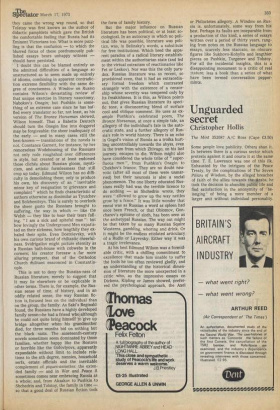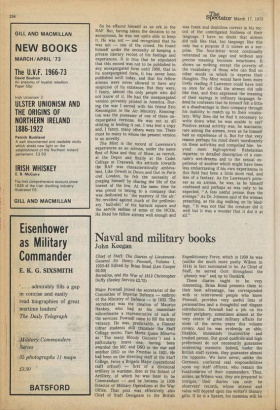Unguarded secret
Christopher Hollis
The Mint 352087 A/C Ross (Cape £3.50) Some people love publicity. Others shun it. In between there is a curious sector which protests against it and courts it at the same time. T. E. Lawrence was one of this ilk. Exhausted by the intrigues of the Peace Treaty, by the complications of The Seven Pillars of Wisdom, by the alleged breaches of faith of the allies towards the4rabs, he took the decision to abandon public life and find satisfaction in the anonymity of ' belonging ' of being a mere member of a larger unit without individual personality. So he effaced himself as an erk in the RAF. But, having taken the decision to be anonymous, he was not quite able to keep it. He was not — and recognised that he was not — one of the crowd. He found himself under the necessity of keeping a private literary record of his feelings and experiences. It is true that he stipulated that this record was not to be published in any unexpurgated form until 1950, that in its unexpurgated form, it has never been published until today, and that his fellow airmen were never allowed to have any suspicion of its existence. But they were, I fancy, almost the only people who did not know of it. He had the unexpurgated version privately printed in America. During the war I served with his friend Eric Kennington in the Air Ministry. Kennington was the possessor of one of these unexpurgated versions. He was not at all stinting in lending it out. I was lent a copy and, I fancy, many others were too. There must be many to whom the present version is no novelty.
The Mint is the record of Lawrence's experiences as an airman, under the name first of Ross and then of Shaw, as recruit, at the Depot and finally at the Cadet College at Cranwell. His attitude towards the RAF was characteristically ambivalent. Like Orwell in Down and Out in Paris and London, he felt the necessity of purging himself by sharing the life of the lowest of the low. At the same time he was proud to belong to a company that was dedicated to 'the mastery of the air.' He revolted against much of the prelimin ary ' bull-shit' of the barrack square and the servile sadism of some of the NCOs. He liked his fellow airmen well enough and was frank and doubtless correct in his record of the unmitigated foulness of their language. I have no doubt that airmen did talk like that, but language like this only has a purpose if it comes as a surprise. The four-letter word continually reiterated on the page and without any precise meaning becomes wearisome. It shows us nothing except the poverty of the vocabulary of those who can find no other words in which to express their thoughts. The Mint would have been more lively reading if Lawrence could have told us once for all that the airmen did talk like that, and then expressed the meaning of their sayings in ordinary language. Indeed he confesses that he himself felt a little at a disadvantage in their company through his inability to match up to their vocabulary. Why then did he find it necessary to write down what he was unable to say? Positive sexual activity was, he maintains, rare among the airmen, even as he himself had no experience of it. But for that very reason perhaps his mind dwelt inordinately on these activities and compelled him beyond mere high-spirited Rabelaisian repartee, to detailed description of a comrade's wet-dreams and to the sexual experience of another which might have been less embarrassing if his own experiences in this field had been a little more real, and less of a fantasy. As for Lawrence's prow ess as an airman, he was, as he himself confessed and perhaps as was only to be expected, "A less useful person than the average." As Dr. Johnson said of the woman preaching, as the dog walking on its hindlegs, "It was not that the creature did it well but it was a wonder that it did it at all."



































 Previous page
Previous page